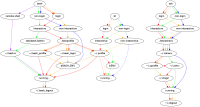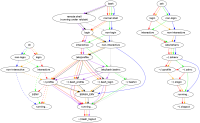Ceci est une ancienne révision du document !
Bash

/bin/bash. Vous pouvez demander à en changer via les formulaires web.
Références
Le manuel de Bash, en français :
Nombreux trucs & Astuces :
- http://www.davidpashley.com/articles/writing-robust-shell-scripts/ (robust scripts)
- http://hacktux.com/bash/script/efficient (builtin)
Ordre de chargement des config de shell
- Bash vs zsh
Voir ces schémas (en) :
Source: http://blog.flowblok.id.au/2013-02/shell-startup-scripts.html
(outil de création des diagrammes : http://hg.flowblok.id.au/shell-startup)
(
Shellshock

problème avec modulefiles, /usr/share/modules/init/bash, soumission de jobs
/bin/bash: module: line 1: syntax error: unexpected end of file /bin/bash: error importing function definition for `BASH_FUNC_module'
Exemples & Astuces
Debugging
- Use “strict mode with pipefail” (exit without continuing at first error)
set -euo pipefail
- Trace each command verbosely :
set -x
- explain code & errors
shellcheck monscript.sh
- online version : https://www.shellcheck.net/ or https://explainshell.com/
- online explaination for error code
SC2154: https://github.com/koalaman/shellcheck/wiki/SC2154
string replace
- remplace
homeparscratchdepuisSGE_O_WORKDIR, sauve dansSCRATCHDIR
SCRATCHDIR=${SGE_O_WORKDIR/home/scratch}
- nomme $OUTFILE et $LOGFILE selon $INFILE (en changeant l'extension)
INFILE=$1 TMPNAME=$(basename ${INFILE%.*}) OUTFILE="$TMPNAME"-done.hdf5 LOGFILE="$TMPNAME".log
- Message d'erreur explicite en cas de variable non-settée
# ${TMPDIR:?"TMPDIR nonexistent"} result=$(ls ${TMPDIR:?"TMPDIR nonexistent"}) if [[ "$result" == "nonexistent" ]] then echo "TMPDIR n'a pas été crée !" exit 1 fi
pattern matching
#! /bin/bash VARIABLE="Let's test this string!" # This is for regular expressions: if [[ "$VARIABLE" =~ "Let's.*ring" ]] then echo "matched" else echo "nope" fi # And here we have Bash Patterns: if [[ "$VARIABLE" == L*ing! ]] then echo "matched" else echo "nope" fi
#! /bin/bash VARIABLE="Let's test this string!" # This is for regular expressions: if [[ "$VARIABLE" =~ "Let's.*ring" ]] then echo "#1 matched" else echo "#1 nope" fi if [[ "$VARIABLE" =~ Let\'s.*ring ]] then echo "#2 matched" else echo "#2 nope" fi
Results: #1 nope #2 matched
To get #1 matching remove quotes around RegExpr or set compat31 : shopt -s compat31
#!/bin/sh thisString="1 2 3 4 5" searchString="1 2" # if you single quote your input, you could do this # searchString=$1 case $thisString in # match exact string "$searchString") echo yep, it matches exactly;; # match start of string "$searchString"*) echo yep, it matches at the start ;; # match end of string *"$searchString") echo yep, it matches at the end ;; # searchString can be anywhere in thisString *"$searchString"*) echo yep, it matches in the middle somewhere ;; *) echo nope ;; esac
Tableaux associatifs
On peut nommer les entrées d'un tableau (l'index).
- astuce :
tab[wwsi]="whatever/wwsi" tab[wwoz]="whatever/to/wwoz" tab[fip]="http://audio.scdn.arkena.com/11016/fip-midfi128.mp3"
Lister le tableau associatif :
- brute :
for i in ${tab[@]}; do echo $i; done
- astuce (boucle induite) :
printf "%s\n" "${tab[@]}"; done
Simplification de code résultante :
Parcours du tableau, connaissant l'index (ici $value).
- Avant :
tindex=$(for i in ${tab[@]}; do echo $i; done | grep ${value}) for ((i=0; i<${#tab[@]}; i++)) do if [[ "$tindex" == "{tab[$i]}" ]] then data=${tab[$i]} fi done
- Aprés :
tindex=$(printf "%s\n" "${tab[@]}" | grep ${value}) data="${tab[$tindex]}"


